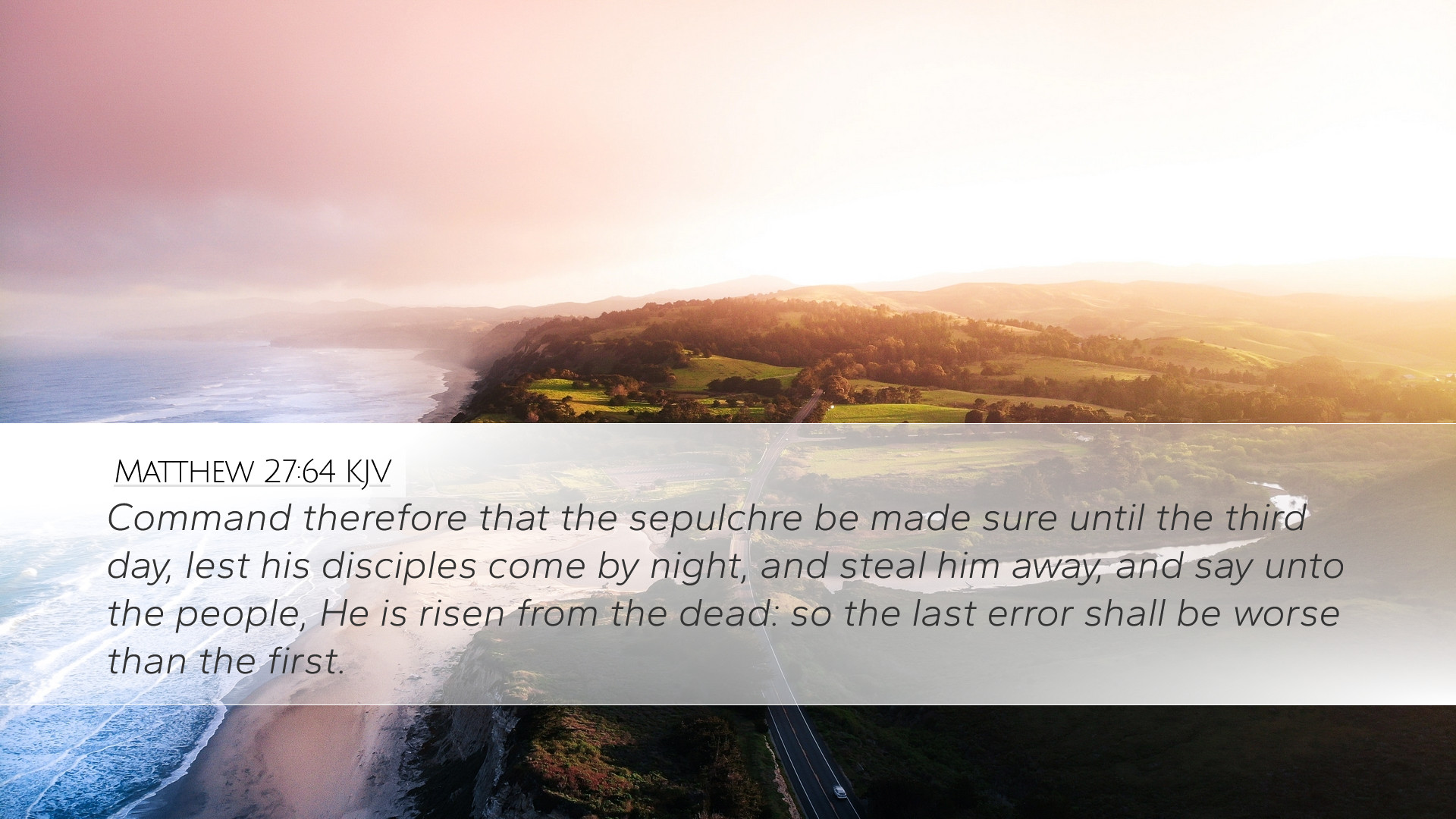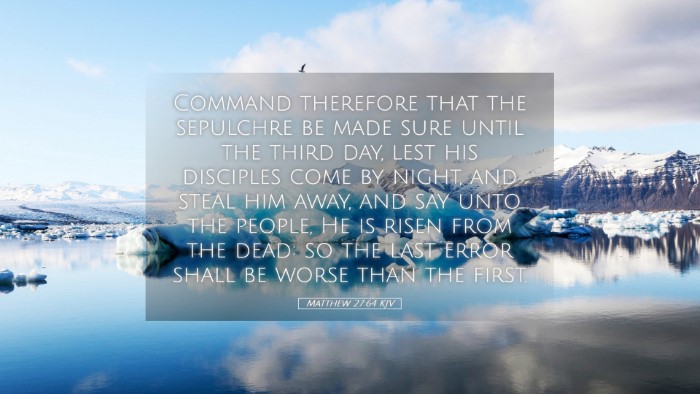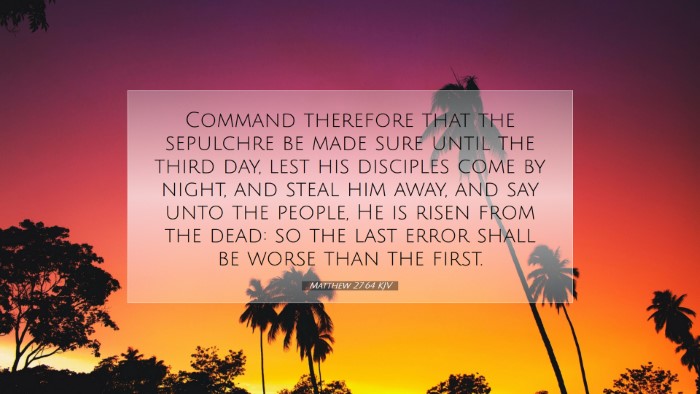Commentary on Matthew 27:64
In Matthew 27:64, the verse reads:
"Command therefore that the sepulchre be made sure until the third day, lest his disciples come by night, and steal him away, and say unto the people, He is risen from the dead: so the last error shall be worse than the first."
Contextual Overview
This verse occurs in the context of Jesus' crucifixion and the subsequent concerns of the Jewish authorities. The leading priests and Pharisees approached Pilate to secure the tomb, fearing the worst—that Jesus’ disciples might attempt to claim that He rose from the dead. This request reveals the deep-seated fear and animosity of the religious leaders towards Jesus' influence even after His death.
The Concerns of the Jewish Leaders
The urgency expressed by the Jewish authorities is significant for several reasons:
- Fear of Deception: They worried that the resurrection would appear as a further validation of Jesus’ claims, exacerbating their initial challenges against Him.
- Public Sentiment: Having already achieved notoriety for His teachings and miracles, a perceived resurrection could galvanize more followers in devotion to Jesus.
- Spiritual Leadership: Their role as religious leaders was threatened by a possible resurrection, which they could not reconcile with their understanding of the law and prophecies.
Analysis of the Request
Matthew Henry points out that the grave's security measures reflect the leaders' recognition of Jesus' extraordinary influence. The request for a guard and a seal demonstrates not only their political acumen but also their profound misunderstanding regarding the divine purpose of Jesus' resurrection. They felt compelled to defend against a claim they themselves feared might be true.
The Implications of "Until the Third Day"
In this directive, there is an implicit acknowledgment of the significance of the third day in the Christian tradition. Adam Clarke interprets this period as one of divine fulfillment, aligning with prophetic scriptures that forecast the resurrection. The insistence on keeping Jesus' body secure until the third day serves to set the stage for the miracle of resurrection, which would later diminish their fears but simultaneously confront their authority.
- Symbolism of the Third Day: This period has rich biblical significance, often correlating with themes of renewal and resurrection throughout scripture.
- Fulfillment of Prophecy: The religious leaders’ actions inadvertently fulfill messianic prophecies, asserting God's sovereign control even in opposition.
The Accusation of Theft
They propose that His disciples might steal the body, a plan they deemed terrifying due to its potential to mislead the public. Barnes points out that this concern is rooted in the manipulation of narrative—if disciples spread the word of resurrection, it would complicate the Jewish leaders' agenda and Roman authority's stance on Jesus.
The very accusation suggests a lack of belief in Jesus’ resurrection but fears its ramifications. It showcases their attempts to control the narrative, highlighting a deep-rooted disbelief that would later culminate at Pentecost when the apostles proclaimed the truth of Jesus' resurrection without fear.
Last Error Worse Than the First
The phrase, "the last error shall be worse than the first," accentuates their conviction that the resurrection narrative would surpass the earlier claims of Jesus’ messianic identity and authority. There is an implicit recognition that an effective resurrection narrative could undermine their religious position and influence.
- The Psychological Projections: Here, we see a psychological projection, where leaders project their fears onto the disciples, fearing they would resort to deceit in an act of desperation.
- The Nature of Deception: They consider the resurrection a fraudulent act, a perspective conflicting with the transformative nature of the resurrection that would call believers to engage in truth rather than deception.
Theological Reflections
This verse invites a deeper theological reflection on the nature of faith and authority. It raises questions about how often skepticism can lead to actions driven by fear rather than faith. The Jewish leaders, in their efforts to secure the tomb, miss the larger theological implications of Jesus’ life, death, and the promise of resurrection.
Furthermore, the verse illustrates that God’s plan cannot be thwarted by human fear or machination. The certainty of the resurrection would eventually transcend the guards at the tomb, proving triumph over earthly authority and doubt.
Conclusion
In summary, Matthew 27:64 serves as a powerful reminder of the human tendency to control narratives out of fear; it reflects the often-misplaced priorities of religious authority against the backdrop of divine purpose. For pastors, theologians, and students of the Word, it calls for an exploration of faith that transcends fear and embraces the miraculous implications of Jesus’ resurrection. In holding this passage, may we recognize not only the actions of the leading priests but also what those actions reveal about our own hearts and beliefs as we encounter the truth of the gospel.


